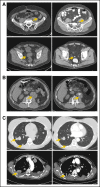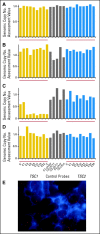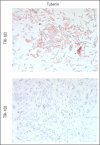Clinical activity of mTOR inhibition with sirolimus in malignant perivascular epithelioid cell tumors: targeting the pathogenic activation of mTORC1 in tumors
- PMID: 20048174
- PMCID: PMC4810029
- DOI: 10.1200/JCO.2009.25.2981
Clinical activity of mTOR inhibition with sirolimus in malignant perivascular epithelioid cell tumors: targeting the pathogenic activation of mTORC1 in tumors
Abstract
PURPOSE Perivascular epithelioid cell tumors (PEComas) represent a family of mesenchymal neoplasms, mechanistically linked through activation of the mTOR signaling pathway. There is no known effective therapy for PEComa, and the molecular pathophysiology of aberrant mTOR signaling provided us with a scientific rationale to target this pathway therapeutically. On this mechanistic basis, we treated three consecutive patients with metastatic PEComa with an oral mTOR inhibitor, sirolimus. PATIENTS AND METHODS Patients with advanced PEComa were treated with sirolimus and consented to retrospective collection of data from their medical records and analysis of archival tumor specimens. Tumor response was determined by computed tomography scans obtained at the clinical discretion of the treating physicians. Tumors were assessed for immunohistochemical evidence of mTORC1 activation and genetic evidence of alterations in TSC1 and TSC2. Results Radiographic responses to sirolimus were observed in all patients. PEComas demonstrated loss of TSC2 protein expression and evidence of baseline mTORC1 activation. Homozygous loss of TSC1 was identified in one PEComa. CONCLUSION Inhibition of mTORC1, pathologically activated by loss of the TSC1/TSC2 tumor suppressor complex, is a rational mechanistic target for therapy in PEComas. The clinical activity of sirolimus in PEComa additionally strengthens the pathobiologic similarities linking PEComas to other neoplasms related to the tuberous sclerosis complex.
Conflict of interest statement
Authors' disclosures of potential conflicts of interest and author contributions are found at the end of this article.
Figures




Comment in
-
Resistance to mammalian target of rapamycin inhibitor therapy in perivascular epithelioid cell tumors.J Clin Oncol. 2010 Aug 20;28(24):e415. doi: 10.1200/JCO.2010.29.4678. Epub 2010 Jun 21. J Clin Oncol. 2010. PMID: 20567010 No abstract available.
References
-
- Wagner A. Treatment of advanced soft tissue sarcoma: Conventional agents and promising new drugs. J Natl Compr Canc Netw. 2007;5:401–410. - PubMed
-
- Hornick JL, Fletcher CD. PEComa: What do we know so far? Histopathology. 2006;48:75–82. - PubMed
-
- Folpe AL, Mentzel T, Lehr HA, et al. Perivascular epithelioid cell neoplasms of soft tissue and gynecologic origin: A clinicopathologic study of 26 cases and review of the literature. Am J Surg Pathol. 2005;29:1558–1575. - PubMed
Publication types
MeSH terms
Substances
Grants and funding
LinkOut - more resources
Full Text Sources
Other Literature Sources
Miscellaneous

